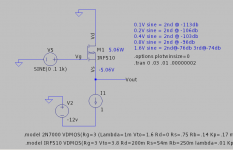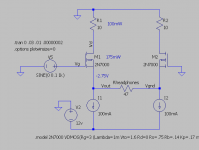I've been poring over and simulating lots of class A buffer circuits lately, and I only just now realized you can hang a mosfet off of ground in the following fashion (see screenshot).
With a second copy of the circuit, you could build a buffer which has no input capacitor and no output capacitor, yet only uses a single supply rail.
Sorry if this is old news for many of you, but I feel giddy at this realization! I can build a directly-coupled buffer for my etymotics with just a wall wart
With a second copy of the circuit, you could build a buffer which has no input capacitor and no output capacitor, yet only uses a single supply rail.
Sorry if this is old news for many of you, but I feel giddy at this realization! I can build a directly-coupled buffer for my etymotics with just a wall wart
Attachments
5 V DC on the output of a line stage would send your power amp into protection. You could add a PMOS (IRF9510) to go one Vgs up. That would get you close to 0 V, but not close enough in practice, as the NMOS and PMOS would not be matched on Vgs.
You can perform a similar trick with BJTs: BC547 on the first stage, BC557 on the second. You may get a few tens of mV of DC offset with BJTs.
You may want to thermally connect the devices to keep the Vgs/Vbe tracking with temperature.
Tom
You can perform a similar trick with BJTs: BC547 on the first stage, BC557 on the second. You may get a few tens of mV of DC offset with BJTs.
You may want to thermally connect the devices to keep the Vgs/Vbe tracking with temperature.
Tom
How do you make sure both ends of the headphone are on the same dc level whatever the circumstances like drift by temperature or differences in individual mosfet's? What amount of difference is allowable before the headphone is damaged by it? You're right on the capslessness, but what if one ear only heats up and the other ear is fried?
Those are certainly valid concerns! You would need to test the buffer with a resistor in place of the headphones and ensure the drift is acceptable.
Perhaps I should state this explicitly for those readers who are unfamiliar: directly coupled audio circuits are inherently risky. Any circuit component failure could lead to damaging your DAC or your headphones. Each reader will need to evaluate for themselves whether eliminating coupling capacitors is worth the risk.
Perhaps I should state this explicitly for those readers who are unfamiliar: directly coupled audio circuits are inherently risky. Any circuit component failure could lead to damaging your DAC or your headphones. Each reader will need to evaluate for themselves whether eliminating coupling capacitors is worth the risk.
Last edited:
- Status
- This old topic is closed. If you want to reopen this topic, contact a moderator using the "Report Post" button.
- Home
- Source & Line
- Analog Line Level
- Directly-coupled buffer with only one supply rail?

